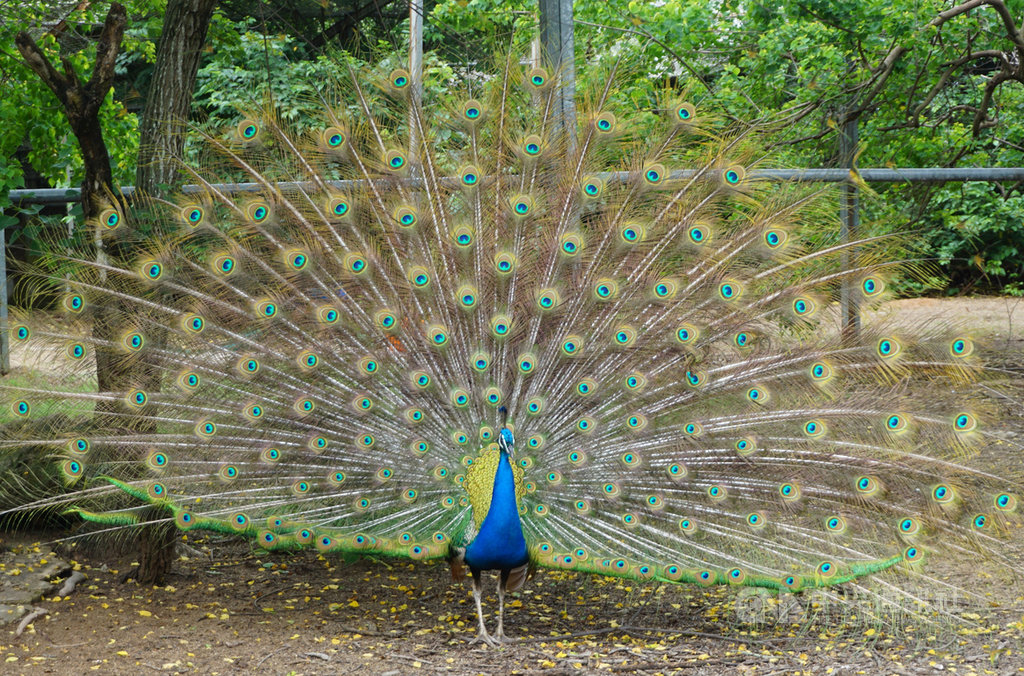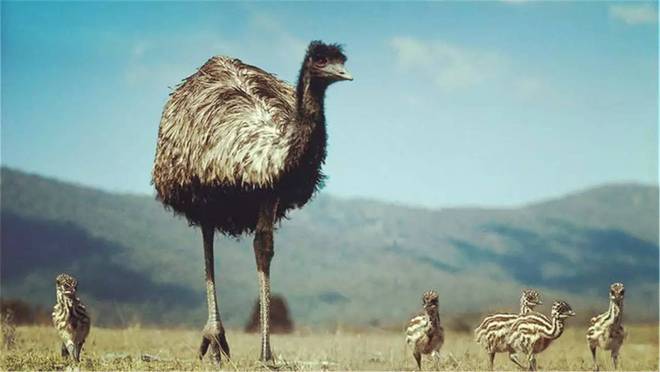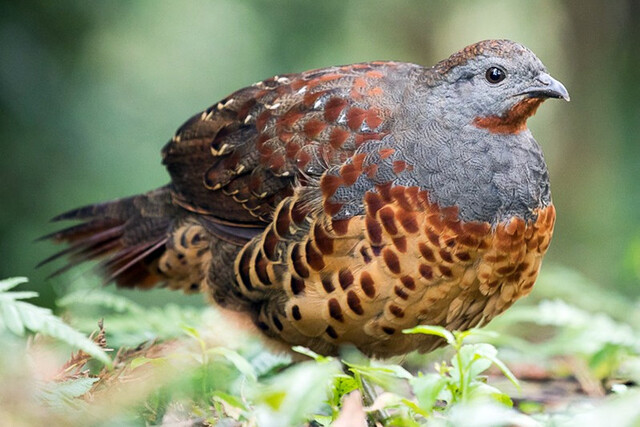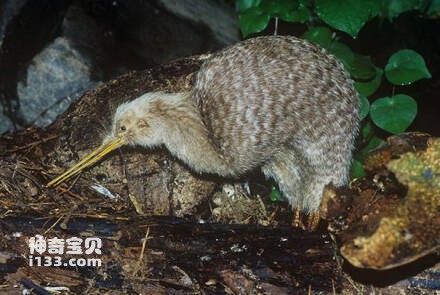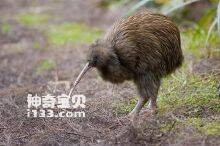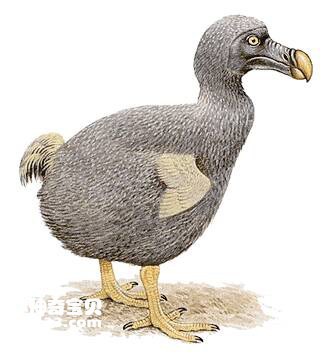Apteryx australis
IUCN
LCBasic Information
Scientific classification
- name:Apteryx australis
- Scientific Name:Apteryx australis,Brown Kiwi,Southern Brown Kiwi
- Outline:Landfowl
- Family:
Vital signs
- length:25-35cm
- Weight:1.2-2kg
- lifetime:About 30 years
Feature
It is an endemic species of New Zealand and the national bird and symbol of New Zealand
Distribution and Habitat
The brown Kiwi is the most common of the kiwis and is found in New Zealand's South Island, North Island and Stewart Island, with three distinct subspecies distributed across the three islands.
It inhabits dense forests and is active at night among dark ferns. Brown kiwis live in burrows, and their nests are dug up for several weeks before they can be used, in order to allow moss and natural vegetation to regrow and provide camouflage.
Appearance
The brown kiwi is 46-50 cm long and weighs 2.125 kg for males and 4 kg for females. It is the most primitive of the snipe birds. It has a small head, a body shaped like a pear, covered with fluffy fine feathers, feathers are soft and featherless. The vestigial wings are covered with feathers, have no tail feathers, and cannot fly. The legs are short and strong, good at running, and can reach 16 kilometers per hour. The kiwi's beak is pointed and slender, about 10 cm long, with cat-like whiskers at the base of the beak; The nostrils are at the tip of the long, curved mouth rather than at the base of the mouth; Small eyes, poor day vision; The ear holes are large and developed, with long whiskers (possibly tactile) at the base of the mouth. The neck is short, the ears are highly sensitive and developed, and the feathers are mottled from charcoal ash to light brown.
The sexes are dimorphic, and the females are much larger, with differences of more than 1 kg. The biggest difference
Details
Brown Kiwi Apteryx australis, foreign languages Brown Kiwi, Southern Brown Kiwi, there are 3 subspecies (1. Brown kiwi: Apteryx australis australis. 2. Brown Kiwi subspecies: Apteryx australis awryi. 3. North Island subspecies of Brown Kiwi: Apteryx australis mantelli.) .

A pair of brown kiwis may dig up to 100 burrows in their territory and use them as shelters, often changing homes daily. They do not leave their burrows during the day, except in dangerous situations. They usually come out at night. Foraging takes place about 30 minutes after sunset. It is dominated by insects, snails, spiders, worms, centipedes, grubs and many orthoptera, and can even eat small lizards and mice, as well as fruit and berries that fall to the ground. The nostrils of the kiwi bird are not at the base of the beak like the thrush or the swallow, but at the tip of the mouth. Its sense of smell is very good, and it can smell the worm more than ten centimeters underground, and then dig it up with its claws or mouth. In addition, its mouth has an unexpected function - when it needs to rest, the mouth can be used as a third leg, like a tripod to support the body, easy and stable.
Brown kiwi is good at running, digging with feet, or pecking east and west with long beak, pecking earthworms, insects and mollusks from the soil and ground rotten leaves and branches, they have a large amount of food, eating dozens of earthworms at a time, and swallowing 500-600 worms a day. According to local legend, kiwis also have many unique abilities, such as the ability to pull rabbits out of tree holes and even fish in the shallows of the coast.

Brown kiwis have poor eyesight and are shy and timid, but they have a keen sense of hearing and smell, as well as a keen sense of touch, which makes them very suitable for nighttime activities. When it is active, it often makes a "kiwi kiwi" call, the male has a high-pitched call, and the female has a hoarse call. Kiwis also have a very good relationship with local residents, and if they do not close the door at night, they often rashly break into the house and become "uninvited guests". Not only do they bear no ill will towards people, but they always seem intent on staying with them for a while longer. They are often curious and playful, and if they do not pay attention, they will drag away small items such as forks and spoons in the house.
Brown kiwis are strictly monogamous birds. Couples live together for at least 2 or 3 breeding seasons. Unable to fly, kiwis build their nests in the lower part of tree trunks or directly on the ground. Breeding period in late autumn, eggs in the female body of the gestation period of up to a month, during the whole pregnancy, the female bird must store enough fat, used to produce a good nutrition good bird eggs. Unable to fly, kiwis tend to nest in holes in trees at the base of their trunks, sometimes just on the ground. The reproductive ability of kiwi birds is not strong, and the female birds generally have to lay eggs once a year, 1-2 each time. Egg white. Although the kiwi is small, its eggs are large, averaging 435 grams. The incubation process lasts up to 84 days and is usually hatched by the male bird. A week after birth, the chicks continue to consume the remaining egg yolk to provide nutrition, and then begin to learn from the male bird foraging and various survival techniques. The feathers of fluffy birds are uniformly brown, and the growth of chicks is slow, taking about 4 years to mature.
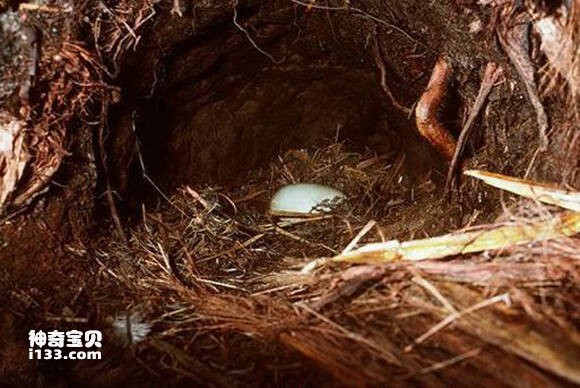
In addition, in view of the fact that cats (carnivores) pose the greatest threat to kiwis, the New Zealand Government has enacted legislation to impose a curfew on domestic cats in areas where kiwis are present, so as to reduce the number of kiwis killed by cats when they go out at night.
Listed on the International Union for Conservation of Nature (IUCN) 2012 Red List of Threatened Species ver 3.1 - Vulnerable (VU).
It belongs to Appendix II: Class I protected animals of the Washington Convention.
Protect wild animals and eliminate wild meat.
Maintaining ecological balance is everyone's responsibility!

